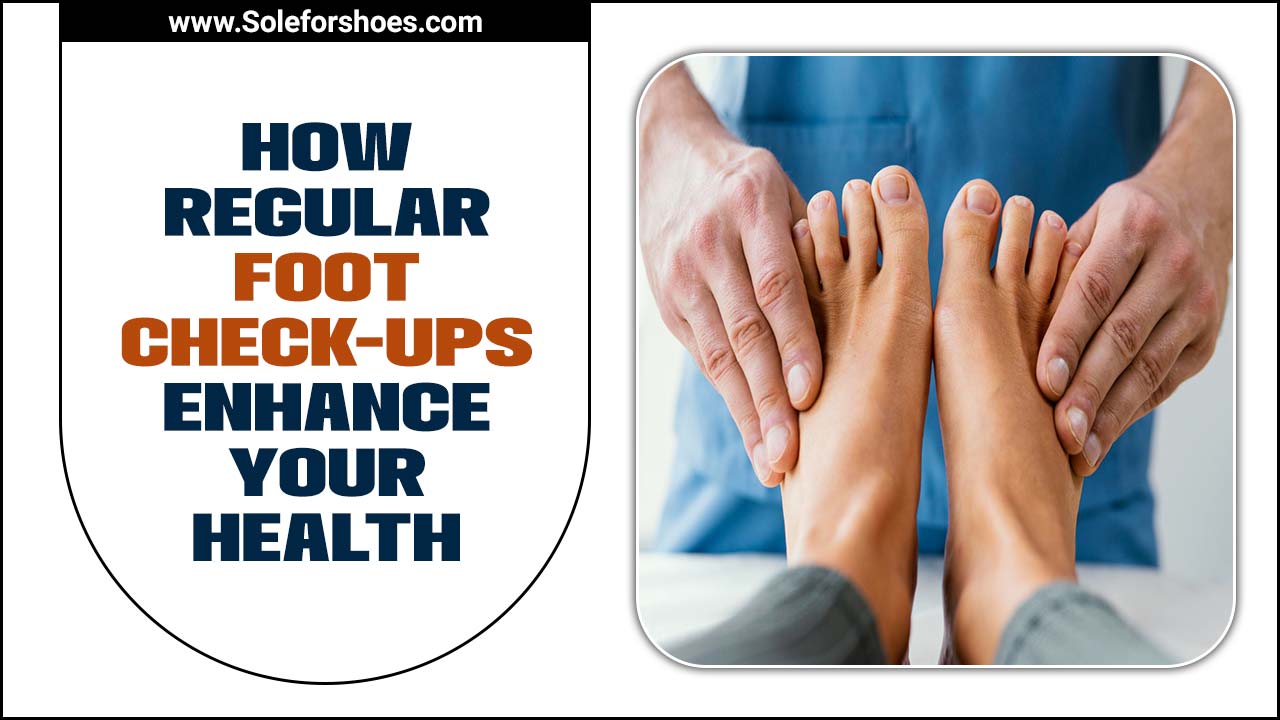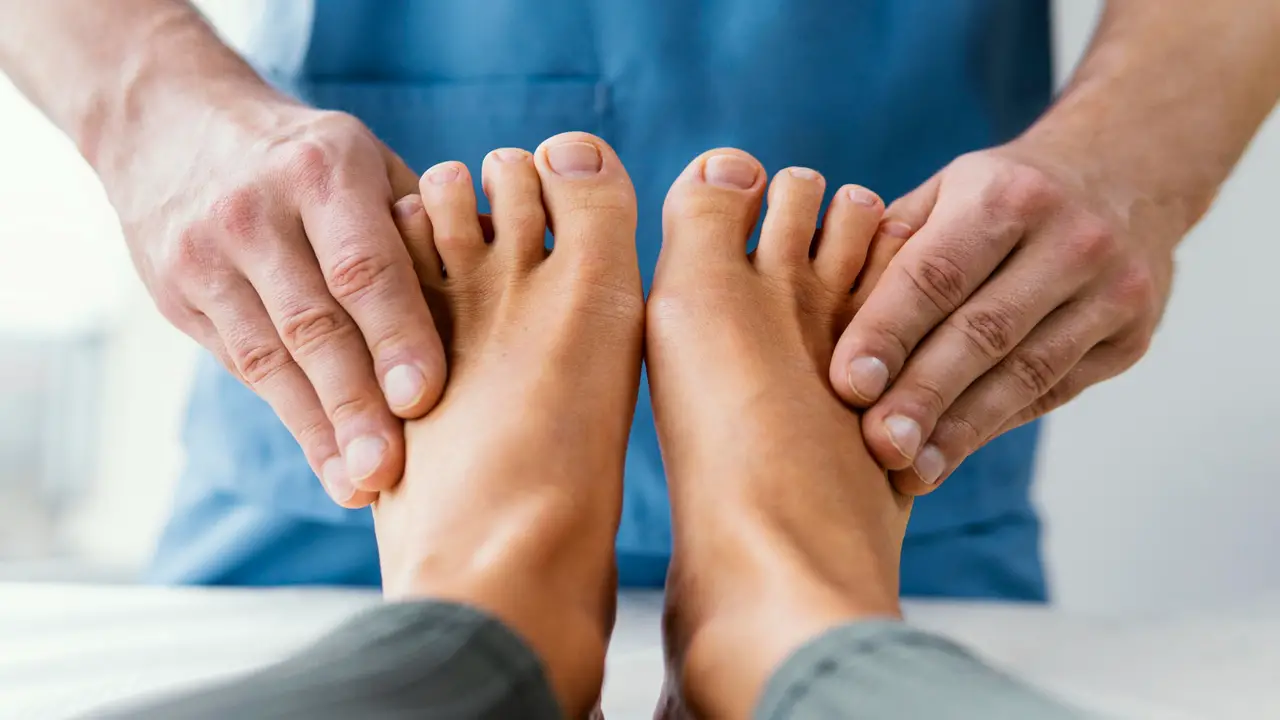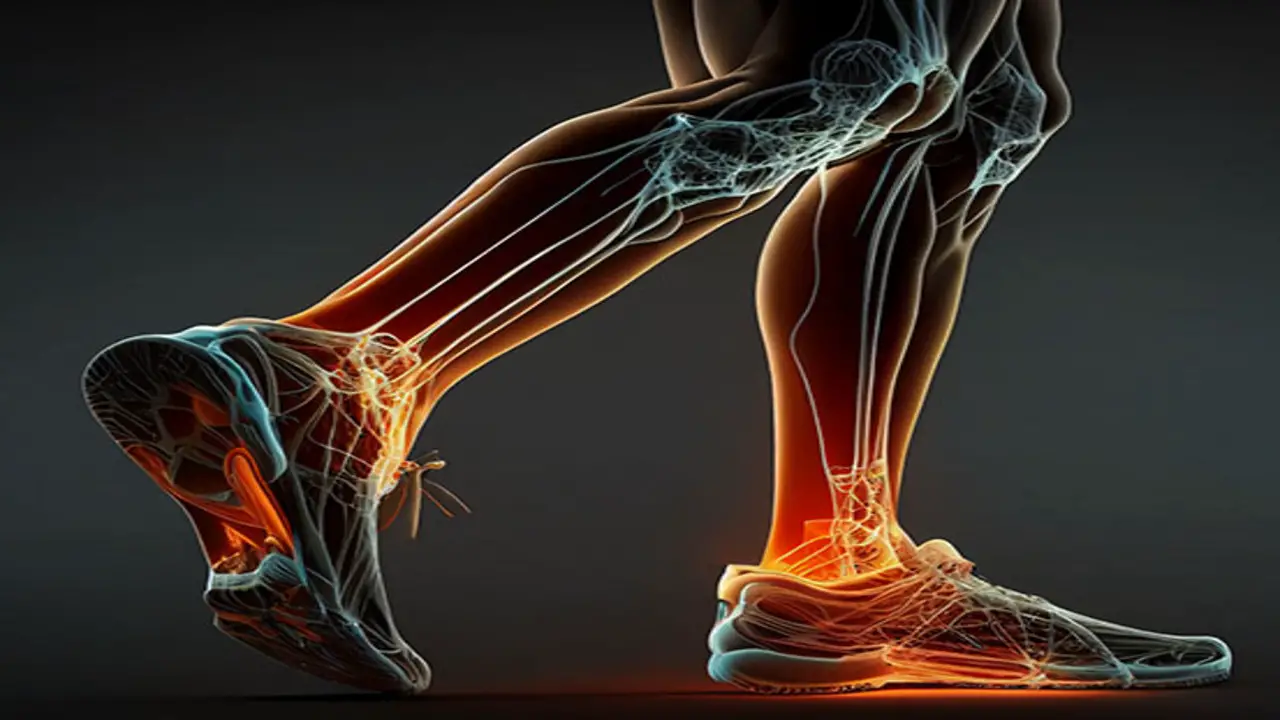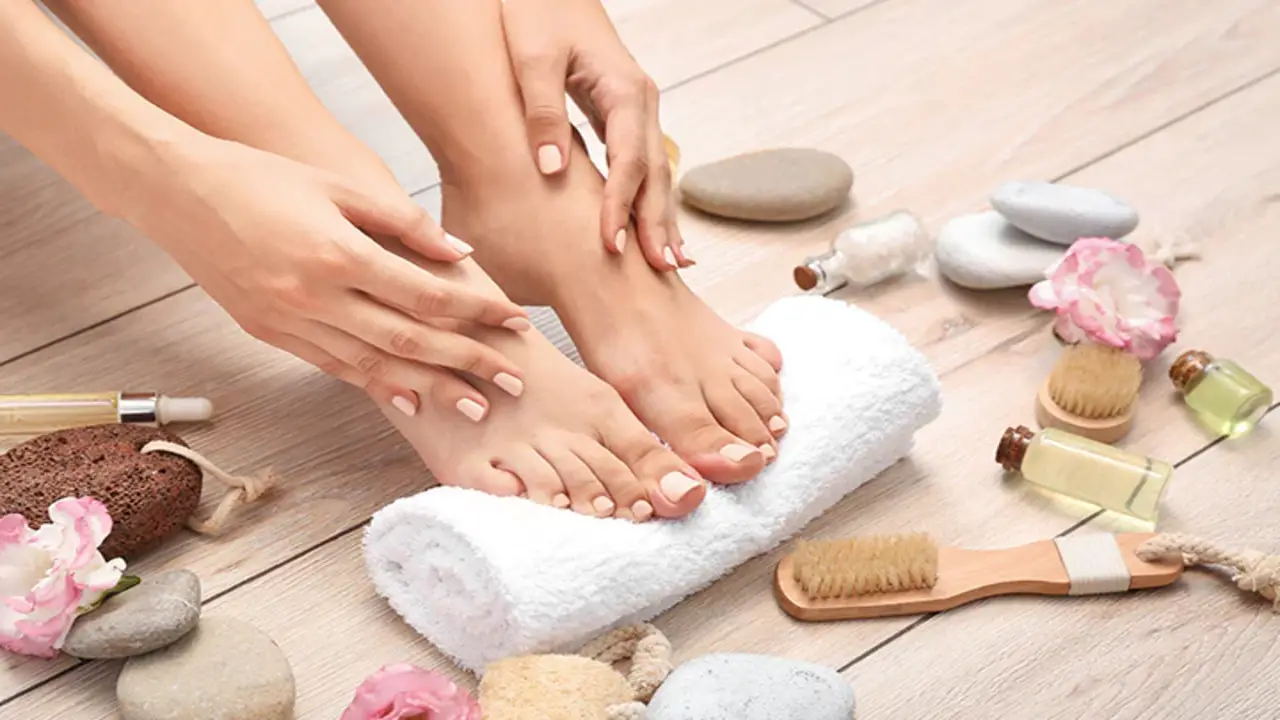Foot health is often overlooked despite the crucial role our feet play in our daily lives. From supporting our body weight to facilitating movement, our feet are constantly under pressure and prone to various injuries and health issues.
Therefore, it is essential to prioritize foot care and include regular foot check-ups in our overall health routine. Just like any other body part, our feet require regular attention and maintenance to ensure they remain healthy and function efficiently.
Here, we will explore the significance of foot health, its connection to overall health, and how regular-foot check-ups can aid in the early detection and management of various conditions. We will also discuss common foot conditions that can be detected during regular check-ups and tips for everyday foot care.

The Significance Of Foot Health

Proper foot care is crucial for overall well-being and health. Neglecting foot health can result in pain, discomfort, and mobility issues. To prevent these complications, it is essential to prioritize regular-foot check-ups. By taking care of your feet, you can improve your quality of life significantly. Don’t underestimate the importance of foot health in your overall health routine.
Regular foot exams allow for risk assessment, early detection of diseases, and preventive care. They can help identify conditions like diabetic foot problems or arthropathy and assess factors such as blood pressure and ankle reflexes. Make sure to seek medical care from a foot doctor to maintain optimal foot hygiene and address any issues.
The Underappreciated Foundation
Feet, the underappreciated foundation of our bodies, supports our weight and enables us to move freely. Regular-foot check-ups are crucial to ensuring the health and functionality of this often overlooked body part.
These check-ups directly impact our ability to perform daily activities. By keeping our feet healthy, we can enhance the overall health of our bodies. It is vital not to underestimate the importance of foot health as a foundation of our overall well-being. Take care of your feet, and your entire body will thank you.
Connection To Overall Health
Your feet play a vital role in your overall health. They can serve as an early warning system for certain health conditions like diabetes and peripheral neuropathy. Regular foot-check-ups are crucial in identifying risk factors and catching early signs of systemic diseases.
By taking care of your feet, you’re taking preventive measures for your overall health. Your feet reflect your overall well-being, so it’s important not to neglect regular-foot check-ups. Maintaining foot health is an integral part of your overall health, contributing to your overall well-being.
How Regular Foot Check-Ups Enhance Your Health

Regular foot check-ups offer numerous benefits that contribute to your overall health and well-being. These check-ups enable early detection of foot problems, helping to prevent complications in the future. By monitoring blood flow, nerve damage, and other foot health factors, foot examinations can identify potential issues and assess the risk of diseases.
Addressing foot problems early on can help you avoid more extensive medical interventions later. Regular-foot check-ups ensure that your feet stay healthy, pain-free, and functional, allowing you to maintain an active lifestyle. Make sure to incorporate these check-ups into your health routine for enhanced well-being.
The Complexity Of Foot Structure And Its Function

Your feet consist of a complex network of bones, muscles, ligaments, and tendons. Understanding the intricacies of your foot structure is crucial in preventing foot pain, deformities, and injuries. Regular-foot check-ups play a pivotal role in assessing the structure and function of your feet, allowing for early detection of any abnormalities.
By taking proper care of your feet, you can maintain their structure and prevent complications. Don’t underestimate the complexity of your foot structure and the importance of regular check-ups. Make sure to prioritize your foot health to keep your feet functioning at their best.
Early Detection And Management Of Systemic Diseases
Regular foot-check-ups play a crucial role in the early detection and management of systemic diseases. By monitoring foot health, healthcare professionals can detect early signs of diseases like diabetes and peripheral vascular disease.
Early detection allows for timely medical intervention and management, which can help control and prevent complications. Your feet can serve as early warning signs, making regular-foot check-ups an essential part of your health routine. Including regular-foot check-ups in your routine helps you stay proactive in your health and ensures that you receive the necessary medical care to prevent further complications.
Prevention And Management Of Foot And Ankle Injuries
Regular-foot check-ups play a pivotal role in the prevention and management of foot and ankle injuries. These check-ups help identify risk factors for potential injuries, allowing for early intervention. By addressing these risk factors, injuries can be prevented before they occur.
Moreover, regular-foot check-ups also aid in the management of existing foot and ankle injuries, ensuring proper medical care and timely treatment. It’s essential not to wait for an injury to happen before seeking preventive care. Prioritizing regular-foot check-ups can help keep your feet and ankles healthy, strong, and free from injuries.
Ensuring Optimal Foot Hygiene

Regular foot-check-ups are essential for promoting good foot hygiene and preventing foot problems associated with poor hygiene. During these check-ups, your feet undergo examination, cleaning, and care to ensure optimal foot health. By prioritizing foot hygiene, you can effectively prevent fungal infections, ingrown toenails, and other common foot issues.
Healthy feet begin with regular-foot check-ups and proper foot hygiene practices. By maintaining foot hygiene, you contribute to overall foot health and well-being. Don’t overlook the importance of regular-foot check-ups in maintaining healthy and happy feet. Stay proactive in caring for your feet to enjoy a comfortable and pain-free life.
Aiding Healthy Aging
Regular-foot check-ups are essential for healthy aging, as they play a significant role in maintaining mobility, balance, and independence as we get older. Addressing foot problems early through regular check-ups is crucial for preserving our quality of life. By taking care of our feet, we can ensure that they continue to support us throughout our lives.
Prioritizing regular-foot check-ups is essential for maintaining healthy, pain-free, and functional feet as we age. Don’t wait for foot problems to arise; be proactive and schedule regular check-ups to aid in healthy ageing.
Common Foot Conditions Detected During Regular Check-Ups
Regular foot-check-ups help identify and address common foot conditions, including calluses, corns, and ingrown toenails. Early detection of these issues allows for prompt intervention and preventive care. Ignoring foot pain, redness, or swelling can lead to complications, which regular check-ups can help catch early.
By staying proactive in your foot health and including regular check-ups in your routine, you enable early treatment and prevent further discomfort. Don’t underestimate the importance of regular foot exams in preventing complications and maintaining overall foot health. Stay ahead of any potential foot problems by prioritizing preventive foot care and regular check-ups.
1.Bunions
Bunions are a common foot problem that can cause pain and discomfort. Regular-foot check-ups can help catch bunions early and prevent them from getting worse. Treatment options for bunions may include lifestyle changes, orthotics, or surgery.
Preventative measures such as wearing properly fitting shoes and maintaining a healthy weight can also help reduce the risk of developing bunions. Visiting a podiatrist for regular-foot check-ups can ensure overall foot health and prevent other potential foot problems. By addressing bunions early and seeking appropriate medical care, you can minimize symptoms and maintain optimal foot function.
2.Hammertoes
Hammertoes, a common foot problem, can be prevented through regular-foot check-ups. Factors like tight-fitting shoes, high heels, and genetics contribute to their development. Early detection and treatment are crucial in preventing further discomfort, pain, and difficulty walking.
Treatment options include changing footwear, using orthotics, and surgical intervention in severe cases. Additionally, regular-foot check-ups help identify other foot problems like plantar fasciitis, bunions, and diabetic foot ulcers. By taking care of your feet through regular check-ups and appropriate footwear, you can enhance your overall health and mobility.
3.Diabetic Foot Problems
High blood sugar levels can lead to nerve damage and poor circulation in the feet, resulting in a range of diabetic foot problems. These include blisters, calluses, ulcers, and infections. Regular-foot check-ups are crucial for detecting and preventing these issues before they become severe.
Additionally, practising proper foot care, such as wearing comfortable shoes and keeping feet clean and dry, can help prevent diabetic foot problems. Diabetic patients need to consult with healthcare professionals to manage diabetes and prevent related complications. By prioritizing preventive foot care and regular foot exams, individuals can minimize the risk of diabetic foot problems.
4.Plantar Fasciitis
Regular-foot check-ups play a crucial role in preventing and managing common foot problems, including plantar fasciitis. This condition, characterized by pain in the heel or arch of the foot, often results from overuse or poor foot mechanics. By visiting a podiatrist regularly, you can diagnose and treat plantar fasciitis before it worsens.
Non-invasive methods such as stretching exercises, custom orthotics, and physical therapy can effectively alleviate the pain and discomfort associated with this condition. Early detection and treatment are essential in preventing further damage and promoting overall foot health.
Benefits Of Regular-Foot Check-Ups

Regular-foot check-ups can provide numerous benefits for individuals of all ages. By prioritizing regular-foot check-ups, individuals can proactively take care of their feet and address any concerns promptly to maintain optimal foot health. Here are some key advantages of scheduling regular appointments with a podiatrist or foot specialist:
- Early Detection And Prevention Of Foot Problems: Regular check-ups can help identify potential issues before they become more serious. This includes detecting and treating conditions such as bunions, corns, calluses, ingrown toenails, and plantar fasciitis at an early stage.
- Maintenance Of Overall Foot Health: Foot check-ups include routine examinations, cleaning, and maintenance of the feet. This can help prevent infections, keep the skin healthy, and maintain proper nail care.
- Management Of Chronic Foot Conditions: For individuals with chronic foot conditions like diabetes or arthritis, regular check-ups are essential for monitoring the condition’s progression and managing symptoms effectively.
- Customized Treatment Plans: During a foot check-up, the specialist can assess an individual’s unique needs and lifestyle to develop a personalized treatment plan. This may include recommendations for footwear, orthotics, exercises, or physical therapy.
- Education And Guidance: Foot specialists can provide valuable education on proper foot care techniques, including hygiene practices, stretching exercises, and self-examination tips. They can also offer guidance on choosing appropriate footwear to support overall foot health.
What To Expect During A Foot Check-Up
During a foot check-up, you can expect your healthcare provider to perform a thorough examination of your feet to assess your overall health and identify any potential issues. Here are some key things that may be included in a foot check-up:
- Visual Inspection: Your healthcare provider will visually examine your feet for any signs of redness, swelling, blisters, or other abnormalities.
- Skin Assessment: They will check for any skin conditions such as dryness, calluses, corns, or fungal infections.
- Nail Examination: Your nails will be examined for signs of infection, ingrown nails, or other nail abnormalities.
- Sensation Test: A sensation test may be performed using a monofilament tool to assess the sensitivity of your feet and detect any loss of sensation.
- Blood Flow Assessment: Your healthcare provider may check the pulses in your feet to evaluate blood flow and circulation.
- Range Of Motion Evaluation: They may assess the flexibility and range of motion in your feet and ankles.
- Footwear Analysis: Your footwear will be evaluated to ensure it provides proper support and fits correctly.
By having regular-foot check-ups, you can catch potential problems early on and take proactive measures to maintain the health of your feet.
Foot Care Tips For Everyday Life

Taking care of your feet is essential for overall health and well-being. By following these foot care tips, you can keep your feet healthy and pain-free for everyday activities. Here are some foot care tips for everyday life:
- Wash your feet daily with warm water and mild soap, then dry them thoroughly to prevent fungal infections.
- Trim your toenails straight across to avoid ingrown nails.
- Moisturize your feet regularly to prevent dryness and cracking.
- Wear comfortable shoes that provide adequate support and cushioning.
- Avoid wearing tight or narrow shoes that can cause bunions or corns.
- Change your socks daily to maintain good hygiene and prevent odour.
- Inspect your feet regularly for any signs of infection or injury, such as redness, swelling, or cuts.
- If you have diabetes or other medical conditions that affect circulation, it’s important to schedule regular check-ups with a podiatrist.
Conclusion
Prioritizing foot health is crucial for overall well-being. Regular foot check-ups not only aid in early detection and management of systemic diseases but also prevent and manage foot and ankle injuries. By ensuring optimal foot hygiene and addressing common foot conditions like bunions, hammertoes, diabetic foot problems, and plantar fasciitis, you can enhance your overall health and aid healthy ageing.
Incorporating foot care tips into your everyday life can further support foot health. Don’t underestimate the importance of your feet – they are the underappreciated foundation that plays a significant role in your overall health. So, take care of your feet and schedule regular check-ups to maintain your well-being.
Frequently Asked Questions
1.What Is A Complete Foot Exam?
Ans: A complete foot exam involves a thorough visual inspection of the feet and toenails, checking for any signs of infection or injury. It may also include testing blood flow and nerve function in the feet. It is recommended for those with diabetes or other conditions that increase foot problem risks.
2.What To Expect At Your Annual Foot Check?
Ans: At your annual foot check, your doctor will examine your feet for any signs of problems or abnormalities. They may perform tests to check circulation and nerve function. Your doctor will discuss concerns and provide recommendations for maintaining healthy feet.
3.What Are The ADA Guidelines For Foot Exams?
Ans: The ADA recommends annual foot exams for people with diabetes. These exams should include inspecting the skin, nails, and foot shape, as well as testing sensation and pulses. Proper foot care education and footwear selection are also emphasized. Regular check-ups can prevent complications associated with diabetes.
4.Why Do I Need A Diabetic Foot Exam?
Ans: Regular diabetic foot exams are crucial because individuals with diabetes face a higher risk of foot problems. These exams help catch potential issues early, preventing severe complications like infections or amputations. During the exam, healthcare providers check for nerve damage, circulation problems, and other potential concerns.
5.Why Is It Important To Visit A Podiatrist Regularly?
Ans: Regular visits to a podiatrist are crucial because they can help prevent and catch foot problems early. These professionals can diagnose and treat conditions like bunions, plantar fasciitis, and diabetic foot issues. Proper foot care contributes to improved overall health.
Meet Millard Mar, the deputy manager turned footwear wordsmith at Sole Chronicles. With a passion for shoes and a knack for Insole Basics, Reviews, Foot Health, and Tips, SoleForShoes is your go-to guru for all things underfoot. Step into a world where style meets comfort, and let each post guide you on a journey through the fascinating realm of footwear.
